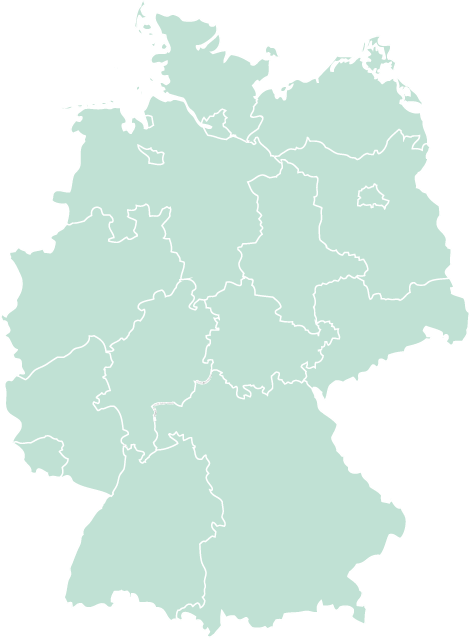We are modern and promote innovation
Your exclusive access to German employers
The labour market in Germany has been undergoing constant change for several years, which is being felt by employers and support staff alike. Of course, this change has not gone unnoticed by recruitment agencies.
We therefore endeavour to evaluate our own offer as up-to-date and radical as possible, taking into account the needs of the applicants.


We are modern and promote innovation
Your exclusive access to German employers
The labour market in Germany has been undergoing constant change for several years, which is being felt by employers and support staff alike. Of course, this change has not gone unnoticed by recruitment agencies.
We are therefore endeavouring to evaluate our own range as up-to-date and radical as possible, taking into account the needs of the assistants.


Discover your ideal employer in Germany
Find your employer in Germany
Deutschland
Focal points of care in the individual federal states
Choose one of the federal states
There are a total of 16 federal states in Germany. Each federal state has developed its own healthcare priorities. Much also depends on the location and population density of the respective federal state. With our interactive map, you can find out more about the focal points of the individual federal states and get an idea of where you would like to work in the long term.

Nordrhein-Westfalen
North Rhine-Westphalia
North Rhine-Westphalia (also NRW) is the most populous federal state and offers a correspondingly dense infrastructure for hospitals, nursing homes and outpatient care services. These are well represented in both urban and rural areas. The networking between hospitals and care facilities is also strong here, which enables seamless care. NRW also has a number of state-of-the-art clinics in urban centres such as Cologne, Düsseldorf and the Ruhr region.
Bremen
Bremen
As the smallest city state in Germany, Bremen offers a dense and well-connected care infrastructure. The short distances and close links between hospitals, care homes and outpatient care services enable efficient care close to home. Specialised care for the elderly, which is characterised by modern concepts and a large number of specialists, is particularly noteworthy. Rehabilitation centres and specialised clinics are also within easy reach. Bremen’s urban character ensures a high availability of care facilities, with innovative care approaches becoming increasingly important in order to meet the growing demand.
Rheinland-Pfalz
Rhineland-Palatinate
Rhineland-Palatinate attaches particular importance to comprehensive care provision that covers both urban and rural areas. There are specialised hospitals and modern nursing homes in the larger cities, while outpatient care services are increasingly used in rural areas. The networking of inpatient and outpatient care is well developed here in order to guarantee holistic care. The federal state also promotes alternative care concepts such as multi-generation homes and residential care communities, which are becoming increasingly popular in rural regions in particular. The state’s rehabilitation clinics also play an important role in aftercare and rehabilitation.
Saarland
Saarland
Saarland offers a dense care infrastructure with a special focus on geriatric care and rehabilitation. Hospitals, nursing homes and outpatient care services work closely together to ensure comprehensive care. The close co-operation between inpatient and outpatient facilities enables seamless care from acute care to long-term care. Specialised rehabilitation centres and facilities for geriatric care are also well represented. Due to the smaller geographical area of the Saarland, care facilities and clinics are usually easily accessible, which is a particular advantage for older people and those in need of care.
Baden-Württemberg
Baden-Württemberg
Baden-Württemberg is an economically strong federal state with an excellent healthcare infrastructure. Modern hospitals, nursing homes and innovative care services guarantee high-quality medical and nursing care. In many regions, there is a strong focus on forward-looking care concepts that combine technological innovation and human care. There is a high density of specialised clinics, particularly in urban conurbations, while rural areas are well served by outpatient care services. Training in the nursing professions is highly valued in Baden-Württemberg, which also ensures the quality of care.
Bayern
Bavaria
Bavaria is characterised by a comprehensive care infrastructure that also includes remote rural regions. Modern hospitals in the cities and well-run nursing homes in rural areas ensure balanced healthcare provision. The Bavarian care structure attaches great importance to quality and tradition, which is reflected in the high standard of care for the elderly and inpatient care. Bavaria is also a pioneer in innovative care concepts, particularly in dementia care. Outpatient care services work closely with inpatient facilities to ensure holistic care.
Thüringen
Thuringia
Thuringia attaches great importance to comprehensive care provision that covers both urban and rural areas. There are modern hospitals and care facilities in cities such as Erfurt and Jena, while outpatient care services are increasingly used in rural areas. Thuringia favours close cooperation between hospitals, care homes and mobile services to ensure seamless care. The state is also promoting alternative care concepts, such as senior living communities and residential care groups, in order to offer older people more flexibility. Rehabilitation centres also play an important role in aftercare and geriatric care.
Hessen
Hesse
Hesse is characterised by a balanced nursing and hospital infrastructure that is reliable in both urban conurbations and rural areas. Large hospitals offer specialised treatment options, while nursing homes and outpatient care services ensure care close to home. There are numerous state-of-the-art care facilities, particularly in cities such as Frankfurt and Wiesbaden. In rural regions, outpatient care services guarantee good care. Hesse favours the combination of inpatient and outpatient care, which enables comprehensive care. There are also many rehabilitation centres that play an important role in aftercare.
Sachsen
Saxony
Saxony offers a well-developed care infrastructure that encompasses both urban and rural regions. There are numerous specialised clinics and modern nursing homes in large cities such as Leipzig, Dresden and Chemnitz. At the same time, care facilities are also well represented in rural areas, often in combination with outpatient services. Saxony is increasingly focussing on the training of nursing staff in order to meet the growing demand for qualified personnel. Innovative care projects, such as alternative forms of living for senior citizens and integrative care concepts, which are increasingly being established in the state, are particularly noteworthy.
Sachsen-Anhalt
Saxony-Anhalt
Saxony-Anhalt relies on a decentralised care infrastructure to provide adequate care in both urban and rural areas. Cities such as Magdeburg and Halle are home to modern hospitals and specialised care homes, while rural regions are increasingly relying on outpatient care services. Mobile care and telemedicine are becoming increasingly important
Mecklenburg-Vorpommern
Mecklenburg-Western Pomerania
Mecklenburg-Vorpommern is heavily rural, which makes care provision a challenge. Nevertheless, the state offers a well-functioning care infrastructure that relies in particular on mobile care services to reach even remote areas. In the larger cities such as Rostock and Greifswald, there are modern hospitals and care homes that are also in demand beyond the region. The state is increasingly investing in telemedicine and innovative care models to improve care for older people. The coastal regions also attract many older people, which further increases the need for specialised facilities such as rehabilitation centres.
Hamburg
Hamburg
As an international harbour city, Hamburg offers a state-of-the-art care and hospital landscape. Hospitals with renowned specialist departments and specialised care facilities characterise the healthcare provision. Care for the elderly in particular plays a central role in Hamburg, with a large number of modern nursing homes and outpatient services. The close networking between hospitals and care facilities guarantees holistic care, from acute care to long-term care. Innovative care concepts, such as dementia residential communities or alternative forms of living for senior citizens, are also well represented in Hamburg. The diversity of care services reflects the cosmopolitan character of the city.
Schleswig-Holstein
Schleswig-Holstein
The northernmost federal state of Schleswig-Holstein offers a well-connected care infrastructure, which is particularly well-developed in the coastal regions. There are numerous specialised clinics and modern nursing homes here, which are often in demand beyond the region. Outpatient care plays a particularly important role in rural areas to ensure the care of older people. Innovative care projects such as senior citizens’ residential communities and alternative living concepts are well represented in Schleswig-Holstein. Rehabilitation centres along the coast also offer specialised programmes that are often used in combination with nursing care. The proximity to nature also promotes special recreational and care programmes.
Niedersachsen
Lower Saxony
Lower Saxony offers a wide range of care facilities that are well networked in both urban and rural regions. In addition to large, specialised clinics in cities such as Hanover and Braunschweig, there are many well-equipped nursing homes and outpatient care services in rural areas. The close co-operation between inpatient and outpatient facilities ensures comprehensive care. Innovative care projects, such as multi-generation homes and alternative forms of living, are becoming increasingly important. Lower Saxony is investing heavily in nursing training in order to meet the growing demand for qualified nursing staff.
Brandenburg
Brandenburg
Brandenburg attaches particular importance to care provision in rural areas. Regional health centres, outpatient care services and mobile care teams provide reliable care even in remote areas. The larger cities such as Potsdam and Cottbus are home to modern hospitals and care facilities that offer specialised treatment. Thanks to telemedical services, medical care is increasingly supported digitally in order to provide those in need of care with good care at home. Brandenburg is focussing on the networking of inpatient and outpatient care in order to ensure holistic care, even as demand for care services increases.
Berlin
Berlin
As the capital city, Berlin offers an exceptionally dense and specialised health and care landscape. Numerous highly specialised clinics, care facilities and rehabilitation centres are located here. The city is a pioneer in the development of innovative care projects, particularly in the field of digitalisation and telemedical care. The high proportion of specialists and the close networking between outpatient and inpatient care facilities guarantee comprehensive care. Due to Berlin’s urban character, care homes and hospitals are easily accessible, which is a particular advantage for older people. The diversity of care services reflects the multicultural population.



